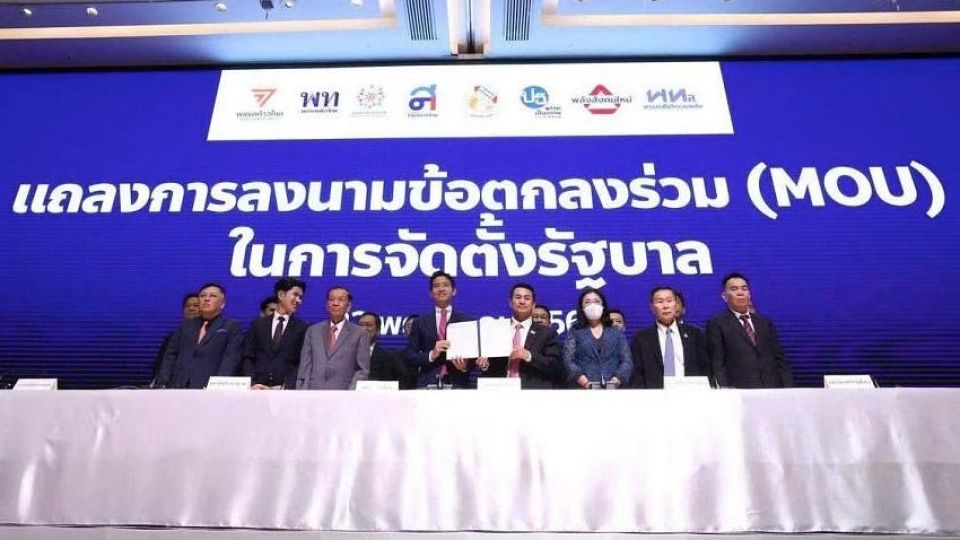May 23, 2023
BANGKOK – Eight political parties that won a majority of seats in Thailand’s May 14 general election signed a memorandum of understanding (MOU) on Monday, pledging to rewrite the Constitution, recognise same-sex marriage, and end military conscription except in times of emergency.
The three goals were among 23 outlined in a deal drawn up after negotiations led by the Move Forward Party (MFP), which won the most seats and the biggest proportion of votes in the election.
In a press conference on Monday, MFP leader Pita Limjaroenrat, whom the coalition plans to support for the position of prime minister, described talks among the parties as “fruitful” and “comprehensive”, but stressed: “Today is only the first step.”
Missing from the document was any mention of the lese majeste law, which the MFP had pledged to amend during its election campaign.
The law penalises each count of insult or defamation against the king, queen, regent or heir apparent with a jail term that can stretch to 15 years. Royalists argue that amending it would affect the standing of the monarchy, but critics allege that the law has been abused for political reasons.
The MOU’s preamble, however, mentioned that the government’s actions must not affect “the inviolable status of the monarch”.
Mr Pita said his own party would continue to push for an amendment of the law.
The other seven parties in the coalition are Pheu Thai, Prachachat, Thai Sang Thai, Seri Ruam Thai, Fair, Pue Thai Rumphlang and Plung Sungkom Mai.
Although the coalition wields 313 seats in Thailand’s 500-seat House of Representatives, it cannot guarantee that Mr Pita, its choice for prime minister, will eventually attain that position. This is because 250 senators appointed by Thailand’s former ruling junta will vote alongside the Lower House on the choice of prime minister, requiring any bloc to muster 376 seats to secure premiership.
Asked by reporters what would happen if it could not obtain the 376 votes required, Mr Pita said it was not something that he was worried about at present.
He said the coalition was publicising the MOU for accountability, though he added that it was too early to talk about the allocation of Cabinet positions.
Other goals outlined by the coalition government include reform of the military, police and civil service, as well as introducing regulations on cannabis to rein in the current free-for-all environment.
On Sunday, Mr Pita tweeted a message in English and Burmese, calling on Thailand’s caretaker government and the international community to expedite assistance to those in Myanmar affected by Cyclone Mocha.
“This is in line with my new foreign policy agenda as PM-elect,” he wrote. ”My policies on Myanmar will engage with all stakeholders, focusing on human security considerations, including humanitarian and economic aspects. These will be implemented with a view to achieving mutual peace and prosperity for Thailand, Myanmar, Asean and beyond.”
Asked to elaborate on his foreign policy on Monday, Mr Pita said his government would ditch quiet diplomacy so that Thailand can assume greater leadership in the international sphere.
The election commission would need up to 60 days after the poll to endorse the results, before Parliament can be convened to choose a prime minster. But some senators have already voiced their opposition to having Mr Pita as prime minister, citing the MFP’s stance on the lese majeste issue. In addition, senators have formed a panel to further scrutinise Mr Pita’s standing.
Meanwhile, the election commission is considering a petition from a politician from the Palang Pracharath Party – the coalition leader of the current caretaker government – questioning Mr Pita’s eligibility as an election candidate because he allegedly owns shares in a media company, in contravention of election rules.
Thailand’s private sector has called for a new government to be formed as soon as possible to shore up investor confidence and to keep the government budget disbursement on track in 2023.


